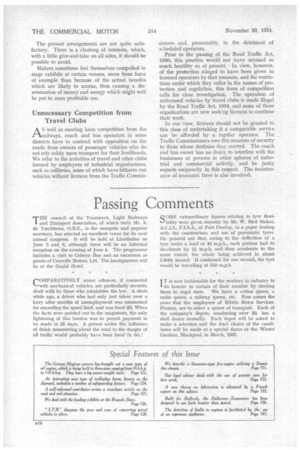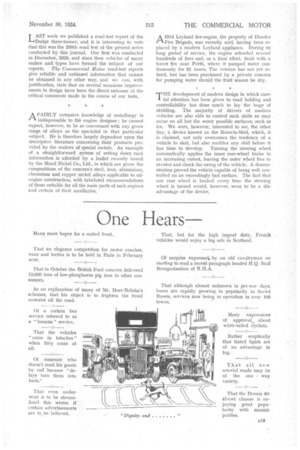Passing Comments
Page 36

Page 37

If you've noticed an error in this article please click here to report it so we can fix it.
THE council of the Tramways, Light Railways and Transport Association, of which body Mr. A. de Turckheira, 0.11E., is the energetic and popular secretary, has selected an excellent venue for its next annual congress. It will be held at Llandudno on June 5 and 6, although there will be an informal reception on the evening of June 4. The programme includes a visit to Colwyn Bay and an excursion as guests of Crosville Motors, Ltd. The headquarters will be at the Grand Hotel.
COMPARATIVELY minor offences, if connected with mechanical vehicles, are particularly severely dealt with by those who administer the law. A short While ago, a driver who had only just taken over a lorry after months of unemployment was summoned for exceeding the speed limit, and was fined M. When the facts were pointed out to the magistrate, the only lightening of this burden was to permit payment to be made in 28 days. A person under the influence of drink meandering about the road to the danger of all traffic would probably have been fined is. 6d.! SOME extraordinary figures relating to tyre flexibility were given recently by Mr. W. Bird Stokes, A.C.I.S., PISA., of Fort Dunlop, in a paper dealing with the construction and use of pneumatic tyres. He pointed out that, owing to the deflection of a tyre under a load at 40 m.p.h., each portion had to decelerate by 21 m.p.h. and then accelerate to the same extent, the whole being achieved in about 1-90th second. If continued fOr one second, the tyre would be travelling at 500 m.p.h.
I T is now fashionable for the workers in industry to
do honour to certain of their number by electing them to regal state. We have a cotton queen, a radio queen, a railway queen, etc. Now comes the news that the employees of Ribble Motor Services, Preston, are to select a queen of transport. Each of the company's depots, numbering over 30, has a staff dance annually. Each depot will be asked to make a selection and the final choice of the candidates will be made at a special dance at the Winter Gardens, Blackpool, in March, 1935. LAST week we published a road-test report of the Dodge three-tonner, and it is interesting to note that this was the 200th road test of the present series conducted by this journal. Our first was conducted in December, 1929, and since then vehicles of many makes • and types have formed the subject of our reports. The Commercial Motor road-test reports give reliable and unbiased information that cannot be obtained in any other way, and we can, with justification, state that on several occasions improvements in design have been the direct outcome of the critical comments made in the course of our tests, AFAIRLY extensive knowledge of metallurgy is indispensable to thb engine designer ; he cannot expect, however, to be so conversant with any given range of alloys as the specialist in that particular subject. He is therefore largely dependent upon the descriptive literature concerning their products provided by the makers of special metals. An example of a straightforward system of setting down such information is afforded by a leaflet' recently issued by the Mond Nickel Co., Ltd., in which are given the compositions of the concern's steel, iron, aluminium, chromium and copper nickel alloys applicable to oilengine construction, with tabulated recommendations of those suitable for all the main parts of such engines and certain of their auxiliaries. A1914 Leyland fire-engine, the property of Dundee Fire Brigade, was recently sold, having been replaced by a modern Leyland appliance. During its long period of service, the engine attended several hundreds of fires and, as a final effort, dealt with a forest fire near Perth, where it pumped water continuously for 91 hours. The veteran has not yet retired, but has been purchased by a private concern for pumping water should the fruit season be dry.
THE development of modern design in which care
ful attention has been given to road holding and controllability has done much to lay the bogy of skidding. The majority of drivers of modern vehicles are also able to control such skids as may occur on all but the worst possible surfaces, such as ice. We were, however, interested to see, the other day, a device known as the Korecta-Skid, which, it is claimed, not only overcomes the tendency of a vehicle to skid, but also rectifies any skid before it has time to develop. Turning the steering wheel automatically applies the inner rear-wheel brake to an increasing extent, leaving the outer wheel free to revolve and check the swing of the vehicle. A demonstration proved the vehicle capable of being well controlled on an exceedingly bad surface. • The fact that one rear wheel is braked every time the steering wheel is turned would, however, seem to be a disadvantage of the device.




































































































